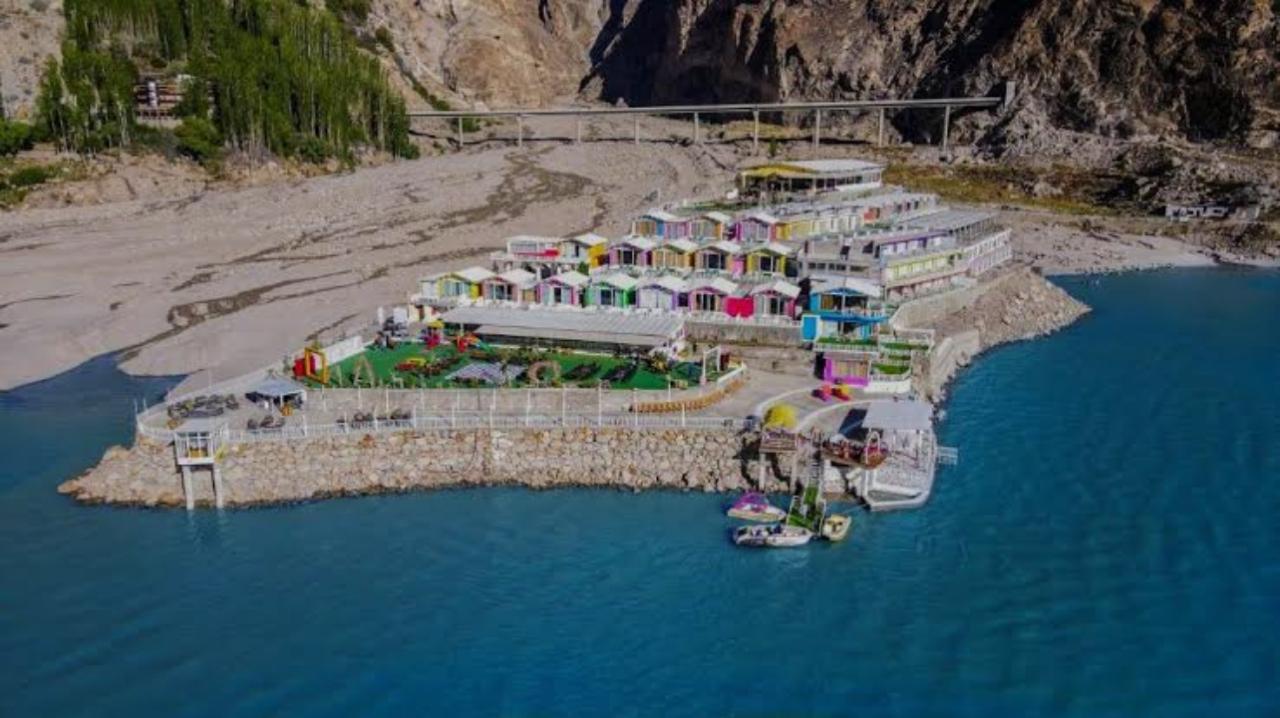Gilgit-Baltistan authorities take action after vlogger claims untreated sewage discharge—Hotel denies allegations, cites natural glacial silt
A viral video by British travel vlogger George Buckley has prompted swift regulatory action against Luxus Hunza, a lakeside resort located on the banks of the picturesque Attabad Lake in Pakistan’s Hunza Valley. The video, which claims the hotel is polluting the lake, has stirred environmental concerns and sparked intense public debate on social media.
Vlogger Alleges Water Pollution at Attabad Lake
The controversy began after Buckley posted a video during his visit to Attabad Lake. He highlighted a brownish tint in the water and an unpleasant odor, which he linked to sewage discharge from the nearby hotel. In the footage, he referred to a local resident who reportedly confirmed the pollution. The video quickly went viral, fueling public outrage and widespread calls for government intervention.
Authorities Launch Inspection, Impose Fine
Government Responds Swiftly
Officials from the Gilgit-Baltistan Environmental Protection Agency (EPA) and the Hunza Deputy Commissioner’s Office conducted a surprise inspection following the video’s circulation. The team found damaged manholes on the hotel premises and responded with immediate administrative actions.
Penalties Imposed on Luxus Hunza
- Authorities sealed several hotel rooms.
- The hotel received a fine of Rs1.5 million.
- The management got a formal notice to upgrade the sewage treatment system within one week, as required by environmental regulations.
Hotel Issues Strong Denial, Cites Natural Glacial Silt
Hotel Defends Its Environmental Practices
Luxus Hunza published a series of statements on Instagram to reject the pollution claims. The resort stated that glacial silt, not sewage, caused the water discoloration.
“We strongly deny these baseless allegations. This reflects a fundamental misunderstanding of natural environmental processes,” the hotel said in its official response.
Natural Sedimentation Explained
According to the hotel, glacial meltwater with high turbidity enters Attabad Lake during summer. This mixing of sediment-rich water with clear lake water leads to a brownish appearance—especially near the resort.
“Every summer, we face the same accusations. But this phenomenon is natural,” the hotel clarified. “It is caused by sediment-rich mountain streams mixing with the lake’s clear blue water.”
Sustainability Measures Highlighted
The hotel also emphasized its commitment to sustainable tourism:
- Conducted a thorough Environmental Impact Assessment before construction.
- Secured all necessary permits and approvals.
- Operates a waste management system that meets local environmental standards.
Vlogger Responds, Demands Updated Inspection Reports
George Buckley responded by challenging the hotel’s claims and transparency efforts. He pointed out that the only shared environmental document dated back to July 2021.
“I’ve requested an updated inspection report—supposed to be conducted quarterly—multiple times. So far, nothing has been provided,” he stated.
Buckley also mentioned the strong sewage odor experienced during his visit. He argued that such a smell could not be explained by glacial sediment alone.
Hotel Invites Public to Verify Claims Directly
In a follow-up post, Luxus Hunza invited the public and environmental experts to visit and assess the situation firsthand. The hotel warned that basing conclusions on visuals or incomplete data could harm tourism and the region’s reputation.
“We urge everyone to reach out for factual clarification rather than spreading misinformation. Attabad Lake is a collective treasure, and we remain fully committed to its preservation,” the hotel concluded.
Environmental Concerns in Hunza Valley
Activists Push for Stricter Oversight
This incident has brought renewed attention to the environmental impact of tourism in Gilgit-Baltistan. Since Attabad Lake remains a major attraction for both local and international visitors, several groups are now urging reforms.
Environmental activists are calling for:
- Strict enforcement of eco-friendly infrastructure
- Regular third-party audits of waste systems
- Transparent environmental reporting for hotels and resorts
Conclusion
While the actual cause of water discoloration at Attabad Lake remains under discussion, the incident underscores the importance of responsible tourism, environmental accountability, and open dialogue between businesses and the public. Whether triggered by glacial silt or pollution, the issue has reignited efforts to protect the natural beauty of northern Pakistan—a shared duty among all stakeholders.






